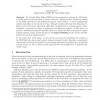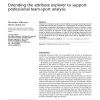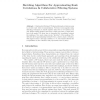157
click to vote
ICDE
2012
IEEE
13 years 4 months ago
2012
IEEE
—MapReduce has emerged as a popular tool for distributed and scalable processing of massive data sets and is increasingly being used in e-science applications. Unfortunately, the...
119
Voted
ISCA
2011
IEEE
14 years 5 months ago
2011
IEEE
Much of the success of the Internet services model can be attributed to the popularity of a class of workloads that we call Online Data-Intensive (OLDI) services. These workloads ...
150
click to vote
JMIV
2011
14 years 9 months ago
2011
In this paper, we first present a new implementation of the 3-D fast curvelet transform, which is nearly 2.5 less redundant than the Curvelab (wrapping-based) implementation as o...
103
click to vote
CORR
2010
Springer
14 years 11 months ago
2010
Springer
A report is provided for the ACM SIGKDD community about the 2010 Workshop on Algorithms for Modern Massive Data Sets (MMDS 2010), its origin in MMDS 2006 and MMDS 2008, and future...
105
click to vote
TC
2008
15 years 2 months ago
2008
Abstract. The Parallel Disks Model (PDM) has been proposed to alleviate the I/O bottleneck that arises in the processing of massive data sets. Sorting has been extensively studied ...
CORR
2007
Springer
15 years 2 months ago
2007
Springer
Abstract. Processing compressed strings without decompression is often essential when dealing with massive data sets. We consider local subsequence recognition problems on strings ...
110
click to vote
IVS
2008
15 years 2 months ago
2008
Advances in interactive systems and the ability to manage increasing amounts of high-dimensional data provide new opportunities in numerous domains. Information visualization tech...
116
click to vote
ICML
2010
IEEE
15 years 3 months ago
2010
IEEE
We consider the problem of extracting informative exemplars from a data stream. Examples of this problem include exemplarbased clustering and nonparametric inference such as Gauss...
103
click to vote
EDBTW
2006
Springer
15 years 5 months ago
2006
Springer
The wavelet decomposition is a proven tool for constructing concise synopses of massive data sets and rapid changing data streams, which can be used to obtain fast approximate, wit...
131
click to vote
SPIRE
2009
Springer
15 years 8 months ago
2009
Springer
Collaborative filtering (CF) shares information between users to provide each with recommendations. Previous work suggests using sketching techniques to handle massive data sets i...



